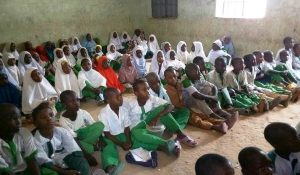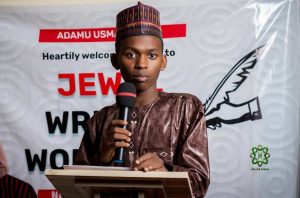
The author at a recent, similar function
By Y. Z. Yaú
Sunday, December 27th, 2020 was another exiting day as the duo of Mujahid Ameen Lilo and Alee Lawal, both teenage authors conducted the Twin Hills Writing Workshop for young aspiring writers. Held at the America Corner, Kano State Library, the workshop had two tow tracks: a short story writing track facilitated by Lilo himself and a poetry section, facilitated by Alee lawal. The closing session featured speeches by prominent Kano–based writers, including Dr. Bala Mohammed of the Faculty of Mass Communications, Bayero University, Kano (and a Weekly Trust back page columnist); Ismail Bala, a leading poet from the north who has many anthologies to his credits, Dr. Maryam Ali, a prominent novelist, Mal Auwalu Hamza, a pioneer in the novel writing culture in Kano and the Bilingual poet and cultural writer, Khalid Imam whose poems have been translated in into many languages and currently the curator of the All Poets Network (APNET).
In a way, all the speakers were united by three things. First, as teachers, they have a keen interest in developing the talents of young people. Second, all are passionate about writing and in which they have done more than their due share in promoting a culture of creative writing in Kano. Both Hamza and Ismail were ex-chairmen of the Association of Nigeria Authors (ANA), Kano Chapter while both Khalid and Maryam were equally state officials of the association. Maryam was, in addition, a one time national official of ANA.
Dr. Bala Mohammed it was who undertook the task of trying to transform the love genre early Hausa novellas into a broader spectrum of concerns when he was the Director General of the Kano Social Reorientation Agency, Adaidaita Sahu, many years back. Third, they are all successful and experienced writers. Listening to them this afternoon was, therefore, more than a semester worth of classroom lectures.
They all made the case about writing, not just as a hobby but also as a vacation and profession from which young writers could earn a living, although Maryam was sensitive enough to put a caveat here that they should not look up to writing as a substitute for a job! This point led to my reflection which was on the very point that Maryam left: whether writing can sustain young people in Nigeria?
Writing in Nigeria face many problems, one of which is the observable decline in reading culture. Because would be writers need to read in order to perfect their crafts, they have to rise up to the challenge of a culture that de-motivates them from reading. But it also de-motivates the writers from writing because the products are ignored by the potential market.
I was born in the “LeaderRoom” days. “LeaderRoom” I later understand to be the way children in my community in my childhood time used to pronounce “Reading Room”. In those days, every community with a primary school had a reading room at the centre of the community where both pupils and members of the public could go and read in the evenings or weekends. There were a few collections but we had opportunity to read. People often came with their books. So, it was not a library in the classical sense but a place where people met people who were interested in reading. It was a major point in laying a foundation for a reading culture that nourished many a generation.
Compare that to what obtains today: first, the reading rooms have disappeared, with many converted into private properties. The libraries outside state capitals have become extinct. Community libraries are laughable structures actually, full of cobwebs. In the state capitals, the libraries have been turned into glorified event centres, hosting more dancing and wedding events than reading activities. It is something to be thankful that we still have the American Corner to meet in the case of Kano. Even in the libraries of the academia, those books are old, rotten, full of dust, with missing pages and parts of pages while the librarians are much younger than any of the books in their collections. But even old books are useful except that people hardly go to read the dinosaur of books.
Last month, I spent a couple of hours at the beautifully set National library in Gombe without seeing a single person walking into the library to consult the books in the shelves. For the past three years, we have laboured to set up a community library in Jamaare, Bauchi State. Each time I visit, the volunteer Librarian complains that no one visits to use the books.
So it is true, we are up against a monster called decline in reading culture. But this is a gross oversimplification of the problem. There is obviously a decline in reading culture but it is much more than a decline in reading culture. That visit to the National Library, Gombe afforded me an opportunity to address young aspiring writers like this group and to address one aspect of this decline of reading culture which I argued, was actually a change in our reading culture. And so today I want address another aspect which is that the thing we see as decline in our reading culture includes a change in our reading culture but also more fundamentally, a profound change in our value system.

The infrastructural anti-thesis to a reading culture across Nigeria, from the Northeast to Niger Delta

All hopes not lost?
Let us start by recalling the past. In the past, the three most important persons in any community in Nigeria were the traditional leader of the community, the Imam of the Friday Mosque or the Head Pastor of the community and the Headmaster of the community school. This is again oversimplification, because in a multi-religious community, you could have two or more religious leaders but I count this as one person because they perform essentially the same functions. In those years, secondary schools were few and mostly boarding, meaning that their students, teachers and principals were accommodated outside the community. Being at the periphery of the community, they were not considered as fully integral part of the community so the status of principals of the secondary schools was indeterminate.
In those days, the most respected of the people were not the richest but the more knowledgeable ones or people who could be relied upon to address communal problems with their wisdom. Usually, the preparation for princes required elaborate training in learning and character so that they could lead their people. In the same way, you did not become an Imam or Pastor or even Headmaster without learning. Each of these three was distinguished by their possession of knowledge. They were not the richest people, often they were poor or just not rich. But they were well respected and their voice carried an authority whose power and command was never doubted.
Communities valued knowledge. Money was useful but it was not valued over and above knowledge. It was needed but it was not the basis of respect in the society. Knowledgeable people were valued for the very reason that they possessed knowledge. For this reason, people who wished to be respected had to acquire knowledge. When you acquire money and you have no wisdom, they derisively dismiss the person as “money missed road”.
Today the table has turned against knowledge. The most important basis for respect in society now is money and more money. Rich people, no matter how foolish, are now the most important voice in their communities. They decide who gets elected or appointed to what position, what issues to be tackled and those to be ignored. In short, they make all the decisions for the community. The community leader is respected only to the extent that he has money. As for the religious leaders, they are tolerated but not respected. Teachers are seen as the dregs of the earth and no village girl wants to marry one.
There is only one way to acquire knowledge that is by reading and learning. Libraries are indispensable instrument for knowledge dissemination. But there are many ways in which you can make money: you can become an armed robber, a kidnapper or a cultist. You could be a heartless corrupt public servant or a politician. Whichever method you take to make your money, you can only amass money at the detriment of the people and the community.
If you are a corrupt civil servant or politician, you make your money by ensuring that the money meant to build schools is put into your private account for you to build mansions. If you are an armed robber, you waylay the parents of the children as they struggle to raise money for the school fees of their children. If you are a kidnaper, you plan and take away their children either on their way to school or on their way back home from school. Cultists kill children in school. The combined effect of all these roads to money making is to make the education system dysfunctional and prevent learning.
But there is also the taunting and exhibition: money makes it look like hard work does not pay, learning does not pay and knowledge is irrelevant in the scheme of things. In this scheme, there is no place for schools or libraries and no one cares about learning and knowledge production. Each new mansion that rises in the community is an assault on the education system and to reading culture. Who will read when it has no value? So we traded money for knowledge and the result is that education is at the bottom of our value system.
This is how we end up with learning infrastructures daily being destroyed. Teachers are ridiculed and laughed at. Libraries are considered more useful if they are converted to events centres. No space is being allowed for learning and reading.
If we are to rebuild a reading culture, we have to rethink our value system. I have no magic formula of how that can be done but I see hope in the work that young people like Mujahid Lilo, Alee Lawan and Adamu Usman Garko are doing. Interestingly, all of them are teens authors, working hard with determination and passion to raise even a younger generation of writers, for who we are here. This reminds us that there is hope and once there is hope we will always strive and in the end we shall overcome and triumph. For this this reason, I see every reason to support the work they do. Congratulations to the beneficiaries of this workshop. We hope you will also run several similar workshops to share what they have learnt here in what we in CITAD call ‘the Learn and Teach Others’ (LATO) paradigm. It is a paradigm that has served CITAD well in its early years, running many LATO computer training workshops for teachers of secondary who then volunteered to teach other teachers, a process that quickly saw the multiplication of ICT skills in and among teachers in our schools.
The author is of the Centre for Information Technology and Development, (CITAD), sponsors of the Twin Hills Writing Workshop, Kano.




























